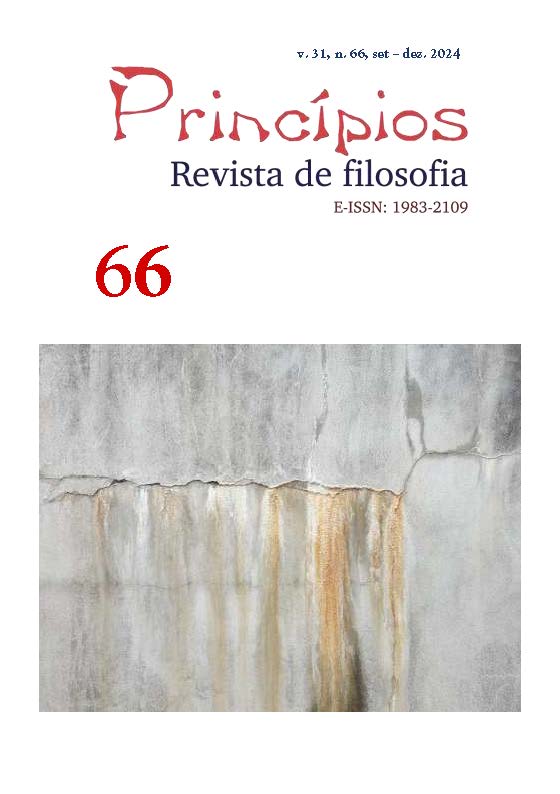Signos, Linguagem e Conhecimento em De Magistro de Agostinho
DOI:
https://doi.org/10.21680/1983-2109.2024v31n66ID35609Palavras-chave:
Saint Augustine, Augustinian conception of language, Teaching, Significabilia.Resumo
Resumo:
Em seu diálogo De Magistro, Santo Agostinho debate se um ser humano pode ensinar algo a outro por meio da linguagem. Para tanto, ele desenvolve sua semântica e uma teoria semiótica geral. O primeiro e menor objetivo do artigo é mostrar que a concepção agostiniana de linguagem de Wittgenstein (1953) se aplica à semântica de Agostinho. O segundo e principal objetivo é mostrar que a sua conclusão céptica é epistémica e deriva das suas fortes exigências de justificação. Para Agostinho, o conhecimento requer familiaridade com os objetos epistêmicos. No caso do conhecimento sensível, a justificação consiste na percepção direta; no caso do conhecimento intelectual, ela consiste na compreensão graças à iluminação divina.
Palavras-chaves:
Santo Agostinho, Concepção agostiniana da linguagem, Ensinar, Significabilia.
Downloads
Referências
References
AUGUSTINUS, A. Opera omnia. Opera et studio monachorum ordinis Sancti Benedicti e congregatione S. Mauri. Post Lovaniensium theologorum recensionem... Accurante J.-P. Migne, Patrologiæ cursus completus, Series Latina, t. 32-47. Lutetiæ Parisiorum, excudebatur et venit apud J.-P. Migne editorem, 1841-1849. Parisii, Garnier, 1858. Turnhout, Brepols, 1982-1993. 2006. 16 vols.
AUGUSTINUS, A. De Magistro. In: AUGUSTINUS, A. Opera Omnia. Ed. Migre, J.P. Vol. 32. Paris, 1845. p. 1193–1220.
AUGUSTINUS, A. Retractiones. In: The Fathers of the Church: a new translation. Vol.60. Washington D.C: The Catholic University of America Press, 2010.
AUGUSTINUS, A. The Teacher. Tranlated R, T, Russell. In: The Fathers of the Church: a new translation. Vol. 59. Washington D.C: The Catholic University of America Press, 2017, pp. 1–62.
BARNES, J. Socrates and the Jury: Paradoxes in Plato’s Distinction between Knowledge and True Belief'. PASS, vol. 54, 1980), p. 193–206.
BURNYEAT, M., F. The Inaugural Address: Wittgenstein and Augustine De Magistro. Proceedings of the Aristotelian Society, Supplementary Volumes, Vol. 61,1987, pp. 1–24.
CHAPPELL, S-G. Plato on Knowledge in the Theaetetus. In: ZALTA, E.N.; NODELMAN, U. (eds.) U. The Stanford Encyclopedia of Philosophy. (Fall 2023 Edition). https://plato.stanford.edu/archives/fall2023/entries/plato-theaetetus/..Accessed: 12.03.2024.
EVANS, G. T. The Varieties of Reference. Edited by John McDowell. Oxford: Clarendon Press, 1982.
GRAMIGNA, R. Augustine and the study of signs and signification. Tartu: University of Tartu Press, 2018.
GRIMM, S. Understanding. In: ZALTA, E.N. (ed.) The Stanford Encyclopedia of Philosophy (Summer Edition 2021) https://plato.stanford.edu/archives/sum2021/entries/understanding/.Accessed: 05.03.2024.
KRAUT, R. Plato. In: ZALTA, E.N. (ed.) The Stanford Encyclopedia of Philosophy (Spring 2022 Edition) https://plato.stanford.edu/archives/spr2022/entries/plato/.Acessed: 05.03.24.
KRIPKE, Saul A. Naming and necessity. Harvard: Harvard University Press, 1980.
MADEC, G. 1975. Analyse de “De magistro”. Revue des Études Augustiniennes, vol. 21, 1975, pp.63–71.
MEIER-OESTER, S. Medieval Semiotics.. In: ZALTA, E.N. (ed.). The Stanford Encyclopedia of Philosophy (Summer 2011 Edition). https://plato.stanford.edu/archives/sum2011/entries/semiotics-medieval/. Accessed: 20.02.2024.
PASAU, R. Divine Illumination. In: ZALTA., E.N. (ed.). The Stanford Encyclopedia of Philosophy (Spring Edition 2020).https://plato.stanford.edu/archives/spr2020/entries/illumination/. Accessed: 07.03.2024.
QUINE, W.V. Word and Object. MIT Press, Cambridge, Mass, 1960.
RUSSELL, B. On denoting. Mind, v. 14, n. 56, p. 479–493.
SILVERMAN, A. Plato’s Middle Period Metaphysics and Epistemology. In: ZALTA, E.N.; NODELMAN, U. (eds.). The Stanford Encyclopedia of Philosophy. (Fall 2022 Edition). https://plato.stanford.edu/archives/fall2022/entries/plato-metaphysics/. Accessed: 20.02.2024.
SORENSON, R. Epistemic Paradoxes. ZALTA, E., N. (ed.). The Stanford Encyclopedia of Philosophy. (Spring 2022 Edition). https://plato.stanford.edu/archives/spr2022/entries/epistemic-paradoxes/. Accessed: 03.03.2024.
TORNAU, C. Saint Augustine. In: ZALTA, E., N. (ed.). The Stanford Encyclopedia of Philosophy. (Summer Edition 2020). https://plato.stanford.edu/archives/sum2020/entries/augustine/ Accessed: 11.03.2024.
WITTGENSTEIN, L. Philosophical Investigations. Translated by G. E. M. Anscombe, P. M. S. Hacker, and Joachim Schulte.4. Ed. Oxford: Blackwell, 2009.
Downloads
Publicado
Como Citar
Edição
Seção
Licença
Copyright (c) 2024 Martin Motloch

Este trabalho está licenciado sob uma licença Creative Commons Attribution-NonCommercial-ShareAlike 4.0 International License.
Autores mantêm os direitos autorais e concedem à revista o direito de primeira publicação, com o trabalho simultaneamente licenciado sob a Licença Creative Commons Attribution que permite o compartilhamento do trabalho com reconhecimento da autoria e publicação inicial nesta revista.
Termos da licença:
| Não Comercial (NC) | Os licenciados podem copiar, distribuir, exibir e executar a obra e fazer trabalhos derivados dela, desde que sejam para fins não comerciais. |
| Compartilha Igual (SA) | Os licenciados devem distribuir obras derivadas somente sob uma licença idêntica à que governa a obra original ou menos restritiva. |


 Português (Brasil)
Português (Brasil) English
English Español (España)
Español (España) Français (Canada)
Français (Canada)


